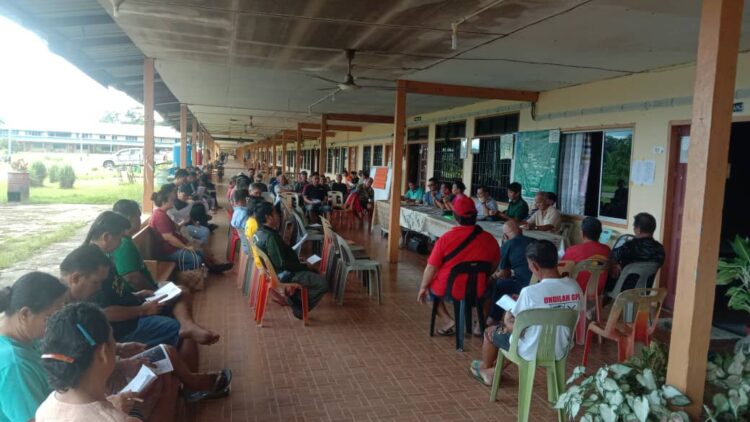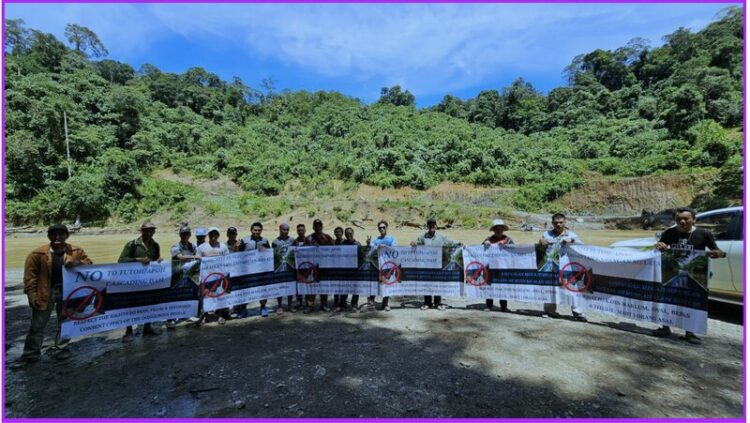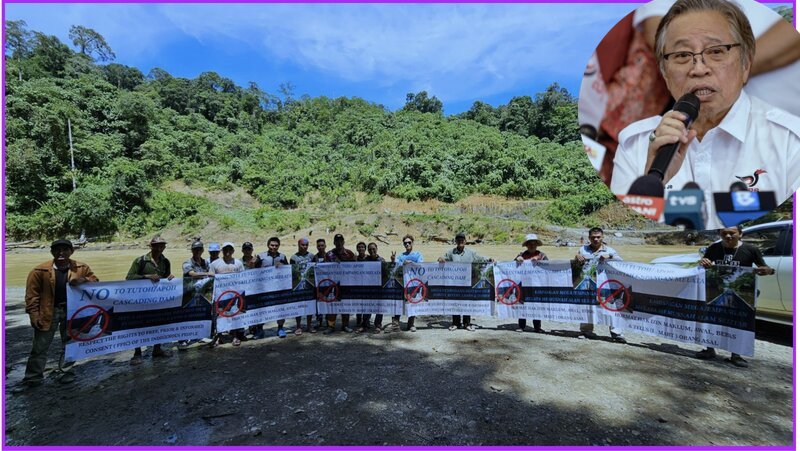Loggers are now leading the charge to save the environment and promote ‘eco solutions’ and ‘green energy’, if you are prepared to believe them.
These billionaire interests have created poverty and desperation in the name of ‘progress and development’ for decades. So, who is surprised that their tune has changed to ‘eco talk’ now it’s the fashionable lingo?
Native communities have been left bereft of the once rich resources of their lands from which they were passed no benefit (despite those progress promises) whilst the wider world has been left to grapple with the climate consequences of this man-made disaster.
The political industrial cartel who ripped out the Islands of Southeast Asia after logging went into overdrive in the 1980s destroyed one of the three great lungs of our planet which had managed our seasons, temperatures and rainfall.
They messed with the global eco-system to stuff their pockets and now they are seeking even greater riches in the name of fixing it. Do we trust the same businessmen politicians who conned the people last time round to solve this problem?
We ought not to and the present Sarawak State Government must take care not to fall into the same modus operandi of steamrollering native communities in the name of doing them good, whilst ignoring the due process laid down by national and international laws and agreements regarding mega-projects and human rights.
Tutoh ‘Cascading Dam’
Unfortunately, the latest ‘green’ initiative proposed by the Sarawak state government has fallen into the same old pattern as before and has provoked a formal protest by villagers in Baram, who have prepared a petition backed by environmental NGOs and launched today (See press release below).
That protest has been met with immediate threats of punitive action by people in authority.
At issue is the sudden announcement by Sarawak’s Premier of plans for a ‘Cascading Dam’ along the Tutoh River that will also impinge on the UNESCO World Heritage Site at Mulu, an area which has been constantly under pressure from logging interests.
This has come after a period of relative calm for native communities in the region, after the proposed Baram Dam was suspended in 2016 in the face of widespread protests and the energy glut created by Sarawak’s superfluity of existing dams.
However, the temptations of dam building have beckoned again with talk of opportunities to supply electricity over the border to the proposed new Indonesian capital of Nusantara, Singapore and other clients.
Many would suggest the real incentive is the opportunity to pour vast sums into mega-projects and cabling infrastructure from which those close to power can hope to benefit. There is also, of course, the excuse that dam building gives to the logging industry to tear out remaining trees.
(Meanwhile, the over provision of hydropower in Sarawak has notably failed to deliver on its original key promise which was to supply electricity to native communities who remain largely in the dark.)
The new justification for dams, of course, is ‘Clean Energy’ rather than ‘Progress and Development’. To keep up with the trends the state government has likewise set about showcasing its commitment to ‘net zero’ targets for its tiny population surrounded by a vast jungle region.
However, at the same time logging licences are being quietly renewed, and native reserves continue to be extinguished and converted to oil palm.
Moreover, dams may be touted as ‘Clean’/’Green’ energy but the truth is they belch methane gas and cause the destruction of massive areas of carbon-absorbing forest, whilst destroying rivers and vital natural eco-systems.
Users of hydro-power indirectly do so at enormous environmental cost – so much for ‘clean energy’ and ‘net zero targets’.
“Green Light” Given In the Name of the Tutoh Community
Despite such misgivings and native concern over their lands and rivers, the Cascading Dam concept (involving multiple dams in succession along a river) has been suddenly proposed and then approved in a matter of just a few recent weeks by the Sarawak Premier, thanks, he claims, to it having been suggested and supported by none other than the communities themselves.
In a lightening sequence of events, Abang Jo announced just last October that he had been approached by the native people directly with the idea to build the cascading dam, primarily to deal with crocodiles he claimed.
He stated he was surprised at this request, allegedly made by the ‘communities in Baram‘, but more than happy to comply:
“In the past, many opposed dam construction, but this time, I was surprised by the request to build a cascading dam on the Tutoh River.
“The reason is to maintain the relationship between humans and crocodiles, but this initiative will also generate income for Sarawak. This is innovation and a new idea…“When you enrich the river with oxygen, you enrich the fish. Just imagine, if you can catch more fish, it will provide additional income to our people.“In addition, the turbulent waters will discourage crocodile presence. So you get two products: fish and fewer crocodiles,” [Borneo Post]
Many who use and depend on the river say they have been equally surprised and do not recognise such a request being made, or for such reasons.
Notwithstanding, the following month the state government (showing unusual speed and efficiency) published a so-called Electricity Amendment Bill (2023) to allow “private and public providers to develop cascading hydro stations and installations to provide for the export of electric to places or countries outside Sarawak“, according to reports.
So, much for the initiative of native folk and the supposedly local concerns and motives.
Since then matters have raced forward, with Abang Jo’s further announcement over the weekend that the project now has the ‘Green Light’, thanks to that supposed endorsement by village folk.
The Premier updated his remarks just yesterday with yet further revelations that the plans for these thinly detailed multiple dams are not only allegedly being called for by the residents of Baram but by the communities of Belaga and Kapit as well!
At the very same time villagers along the Totoh river, such as in Long Terawan, have found themselves confronted over recent days by unannounced Land & Survey teams landing in their midst and seeking to conduct highly controversial ‘perimeter surveys’ on their lands.
“If anyone obstructs the conduct of the Sect.6 perimeter survey, the Headman can lodge a police report” – Local assemblyman
These surveys need to be agreed, but the majority of villagers in places such as Long Terawan, who have been forced to fight off aggressive loggers for years, had agreed to no such thing – they are signing the petition to make that point.
Their protest has for now suspended that survey from being carried out, but it provoked a threatening text from their local GPS state assembly member, which suggested non-compliant villagers could soon find themselves subject to police reports.
The issue with perimeter surveys, introduced as an amendment to the original Sarawak Land Code of 1957, is that in the name of giving the villagers title to a small amount of pretty worthless territory around their jungle settlements, their Native Land Rights over vast surrounding areas are then extinguished.
This has allowed in loggers to obliterate native hunting grounds and customary lands and later transform those areas into plantations, or in this case dam building.
Not just Long Terawan but villages all along the Tutoh River are now finding themselves confronted by these survey demands, says the Save Rivers NGO – ever since the announcement about the dams.
Government Appointed Headman
There has been another change to Sarawak law to further disadvantage natives in the unequal struggle for their resources, namely the appointment by the state of headmen who were previously elected by their community.
Time and again, as Sarawak Report and Radio Free Sarawak have reported, headmen who represented their communities have found themselves replaced by personalities more congenial to the local GPS YB or MP, who often appear to be highly sympathetic to logging interests as opposed to the interests of their constituents.
In Long Terawan, campaigners are claiming this also is the case. They claim the YB and GPS state government has apparently taken the agreement of their own appointed headman and his council to claim the dam projects have the agreement of the community, when they do not.
Those who are aggrieved say the community has not been consulted about the extremely hasty plans. Nor were they consulted over the invitation to survey their lands with the clear intent of pushing forward this project as fast as possible. Such community consultation is their legal right.
Yet, the response of the local state parliamentarian, YB Datuk Gerawat Galà, – communicated by WhatsApp message to protestors – appears threatening to say the least:
“NCR Perimeter survey under Sect.6 of the Sarawak Land Code (SLC) has been conducted by L&S all over S’wak wherever there is a request made by the NCR owners through their KM/KK [Council/ Headman] for such survey….
The allegation that the govt use Sect.6 perimeter survey to take NCR land is totally false and without any basis or proof. …..Therefore there is no basis for those opposing Section.6 perimeter survey to complain that they will loose their NCR rights..
I understand that the dialogue with the KM/KK [Council/ Headman] on the Sect.6 NCR perimeter survey has already been held by the Land and Survey and they are satisfied that Lg Terawan community have requested for and agreed to the Sect.6 perimeter survey….
If anyone obstruct or interfere with the conduct of the Sect.6 perimeter survey, the KM/KK[Council/ Headman] can lodge a police report against such person and that person can be charged in court for obstructing public servant from carrying on their lawful duties.”
Those who reject the claim that a majority of their local community have supported an invitation to the Land & Survey department point out that in the absence of a consultation exercise they cannot know who has supported the proposal and who has not.
Neither have the villagers been sufficiently informed about the dam project itself to make their judgement either way.
Yet, already they are being threatened with criminal prosecution by their own state representative for voicing an objection to the sudden rush to survey their land which just happened to come hard on the heels of an announcement they do not recognise, which is that they themselves ‘requested’ for the cascading Totoh dams to be built.
Such conflict is nothing new, just the slogans. It is a story constantly being heard from communities in Sarawak, particularly in areas where politically backed encroachments are taking place in their land.
Save Rivers in their press announcement today and in their petition to the Sarawak State Government has made clear that due process that has been breached by these recent actions and threats against villagers.
In short, there has been no project disclosure, no community consultation and no environmental impact assessments that would justify the claims being made that communities have requested or welcomed the damming up of their river on the questionable grounds they ‘no longer use it’ and want rid of crocs.
If the state government and Premier have been misled on this matter by false or biased assurances which have caused them to make sweeping and faulty announcements about the alleged wishes of the people of Baram, this is the time to pause these plans and restore due process.
Press Release By Save Rivers
New Cascading Dam Plans Leave Communities in the Dark (16th January 2024)
This month, communities impacted by the proposed Tutoh/Apoh cascading dam project are busy collecting signatures for a petition to the Premier of Sarawak’s office. The petition is currently 500 signatures strong. It expresses concerns about the project and demands community interests and Indigenous rights are not sidelined in the name of development.
Community members have reached out to relevant authorities asking for more information on the proposed dam. The Premier of Sarawak Abang Johari Openg has previously indicated there are plans for construction to go ahead, suggesting at the Baram Regatta in September that Baram communities had requested the dam be constructed. The Borneo Post at that time quoted him as saying “if these rivers are no longer used, why not let us build cascading dams?” and “It enriches the fishes and chases crocodiles away.”
Many community members find these comments alarming. “We are not against development,” explains Ding Laing of Long Panai — one of the villages along the Tutoh river. “But we are very concerned when development projects are brought up in a manner where we as the affected communities are never first approached and informed of it. So, to suddenly read about it in the papers; we become very concerned.” Long Panai community members wrote a letter last November to the Premier’s office requesting more information and engagement, and are yet to receive a response.
“This has always been our struggle in Baram. It is difficult to access and obtain information in regards to development plans and land issues from state agencies and departments. And when we raise concerns and rightly request for information, we are perceived as uncooperative and resisting development,” said Celine Lim, Managing Director of SAVE Rivers, a Miri-based Civil Society Organisation (CSO) that advocates for Indigenous People and environmental rights.
“The suggestion that communities no longer use the rivers is particularly alarming and demonstrates that policy makers are out of step with reality. While it is vital to transition to renewable energy, this energy transition must be just and that includes upholding the Free Prior and Informed Consent (FPIC) rights of the Indigenous People. In our letter to the Premier office last year, we requested access to feasibility studies of these proposed cascading dam sites and research that highlights the connection of dam constructions as an effective crocodile population control. We also have not received any response,” she added.
“We are also concerned about the impact of the cascading dam on Mulu — which is a UNESCO World Heritage site — as the Tutoh river is connected into the national park. This is why we want to form a dialogue with the relevant authorities. Consultations must be done prior to any development plans affecting our ancestral home and only then we can be well informed enough to collectively give our consent or not,” Willie Kajan from Mulu explains.
“The 500 signatures that have been collected so far clearly express the sentiments of the grassroots and affected community of the proposed plan of the Tutoh and Apoh cascading dam.” Willie Kajan added.
The petition with the signatures will be handed-over to the Premier office at the end of the month and copied to relevant departments.
Mulu communities expressed their resistance to the proposed Tutoh/Apoh cascading dam citing lack of full community consultation and project disclosure.

For more information on this grassroot initiative, please contact: Willie Kajan: 60 12-872 9159, or Dominic Usek: 60 11-2509 6674, or Celine Lim: [email protected]


